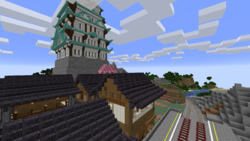Hakone
Views
Actions
Namespaces
Variants
Tools
| Locale | Tai Hing |
|---|---|
| Number of lines | Hakone Line, Seiyo Shinkansen |
Hakone is a village in Tai Hing, Lamtsu Capital City, Hon Kwong Province, Federation of Sorano. As of June 2022 the village had a population of 459 residents, with a population density of 65 persons per square kilometre.
Geography
Hakone is located at the tip of Tai Hing island. It is bordered by the Tai Hing forest to the south and west, the Hakone Strait to the north, and the Tsubetsu Plateau to the east.
History
Founding and early history
Hakone was founded in the 12th century by the Kingdom of Misato, shortly before it's conquest by the Fuka Clan. Being the border town between The Empire of Sorano's Tai Hing and the Fuka Clan, this would lead to the town becoming heavily fortified and militarized.
In 1372, the foundation stone of what would become Hakone Castle was laid down where the current remains stand. Hakone Castle was meant to be a border fort at the border between the Sorano Kingdom and the Fuka Clan. The Fuka Clan was the dominant clan in the region from the breakup of the Koga Shogunate into 12 different regions, controlling most of the land in the Highly-prized Nagano (Joestu) region. This however did lead to many of the border states conducting constant raids in an attempt to demoralise the people, and one of the largest threats was the Empire of Sorano. Controlling a huge amount of land and a popilation of 7 million to the Clan of Fuka's 12, they were able to concentrate their efforts on the north as their southern regions all bordered the sea. However, not much would go on between the two rivals, where the constant raids became a part of life for those living on the border. That however changed with the Sora-Fuka war, which saw Sorano emerge victorious and gain the Fukan port city of Tai Hing. This was a devastating blow to the Daimyo's of the Fuka Clan, as it exposed significant weaknesses and drawbacks in their military hierachy and border defence strategies. As Such, the leading Daimyo, Fuka Tokunada, ordered the construction of border walls and forts along important mountain passes. Hakone, less than a kilometer away from Tai Hing, managed to survive the assult due to the efforts of the unknown samurai who reportedly slew 70 men single-handedly. And so, Hakone became one of the most important border cities during this period. By 1473 all of Nagano excluding the Sorano Kingdom would come under the banner of the Fuka Clan, now the Fuka Shogunate.
In 1643, the crumbling influence and internal power struggles of the Fuka Shogunate led it to collapse and cause a power vacuum not only in Nagano, but in the surrounding regions as well. The Empire of Sorano and the Joestu Clan both rushed for a piece of the falling shogunate. This resulted in a 30 year period of pushing back and forth for control of the Capital, Fuka. Hakone was the first to fall, as the Mercenary armies of Sorano broke through the severly understaffed Hakone Castle. This lack of manpower stemmed from the fact that many of the Damyios of the Fuka Clan, realising that they were likely to lose, refused to send aid to each other and only focused on defending their own territory. In 1656, the decisive battle of Yosen handed the Capital and the Emperor to the Joestu clan, ending the war. Hoever, the Empire of Sorano would gain significant amounts of territory in the West and South, With the Sorano Border extending all the way to Ome.
Modern day
Today, Hakone is mostly a tourist attraction for visitors from Lamtsu Capital City, as well as being the home for the famous Hakone Tea Company. Hakone Castle especially, was very important to keeping the tourism in the region alive. Hakone is also one of the 2 gateways to Mishato City, the most important tourist attraction in the whole of Lamtsu. Due to Hakone's historical value and proximity to Mishato City, the town also benefits greatly during religious festivals.
Economy
Hakone survives mostly on a tourist economy, spurred by the traditional ways of life practiced by the residents. However, there is some manufacturing in the area as well, as there are 2 mines in the town that do produce goods and provide employment for half the adult population. The Hakone Tea Company is also headquartered in the town.
Transport
Hakone is served by the following lines:
